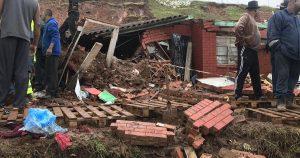
Umm Muhammed Umar
Thousands of people are still experiencing difficulty accessing water and health services, following the devastating flash floods in KwaZulu Natal about two weeks ago. Over 400 people have lost in lives, with several thousand still living in temporary shelters, having lost their homes and belongings. This is on the back of inclement weather still expected for the KZN region, Free State, and the Eastern Cape. Radio Islam spoke to Doctors Without Borders’ (MSF) Coordinator, Monica Gania.
Gania said that the MSF team had been on the ground for more than two weeks now. They had assessed many needs: medical needs, access to chronic medication for things like HIV, TB, diabetes. She said, “A lot of people were cut off – there are around 40 000 people in community halls and shelters.” She added, “we were trying our best, we’re supporting three shelters, are trying to get chronic medication to people.” Teams of doctors, nurses and mental health counsellors are staffing mobile health response units of the provincial health authority.
Some of the challenges, not only faced by residential areas, but hospitals and health clinics that work in those areas is that many of them are still without clean water, without electricity, without even adequate sanitation. This exacerbates the tragic situation. Gania said that one of the biggest crises looming is because of poor sanitation at the moment, due to the flooding and lack of potable water. She said, “So MSF is on ground, putting up portable toilets, bringing in water tanks and water storage units, so that clean water can be given to the communities where we are.” In light of the lack of electricity for refrigeration, Gania added, “We are supporting as best as we can when it comes to being able to store medication etc. A lot more work still has to be done in this area.”
Gania said that the threat from waterborne diseases, following the flooding, is quite high. She said that MSF had been informed that there are around 30 clinics without water that need tankers and storage units, and that there are water and sanitation teams on the ground, assessing the potential danger, so that the situation could be remedied quickly.
Finally, Gania was confident that MSF would be on the ground for as long as needed, in KZN, where, she said, they have been for the last few years, offering support in areas such as Eshowe.







0 Comments